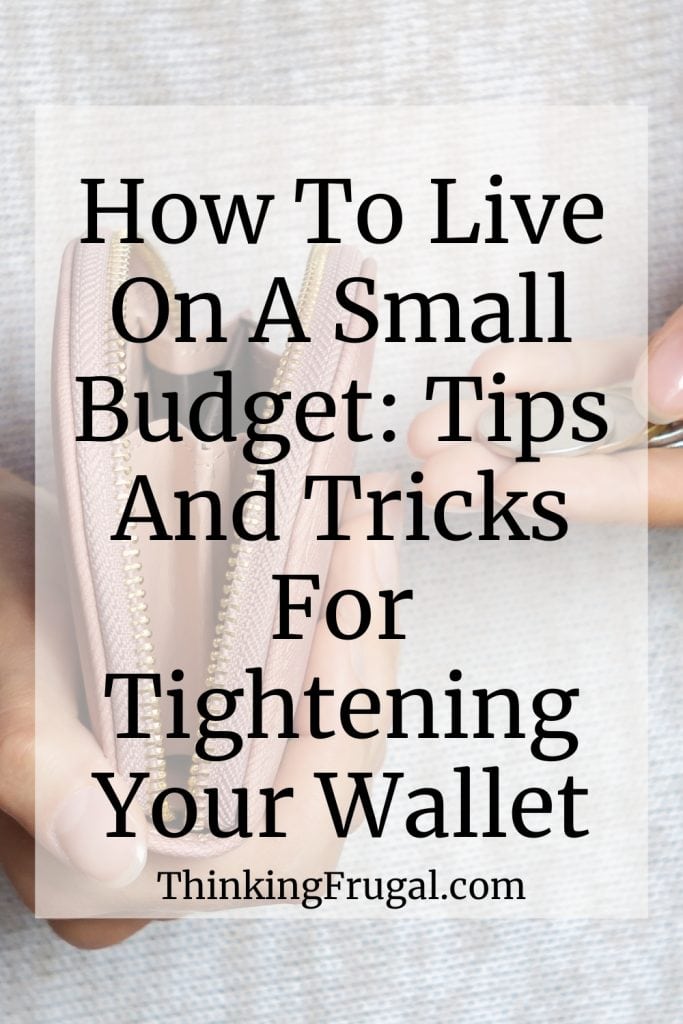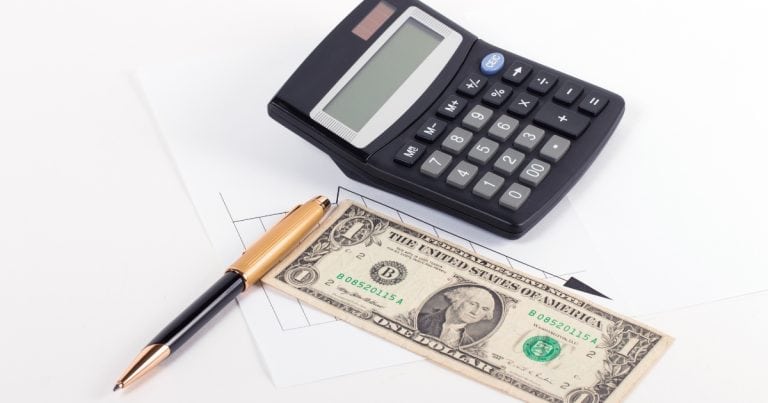How to Live on a Small Budget: Tips and Tricks for Tightening Your Wallet
I make money on some of the products and services I mention on Thinking Frugal through affiliate relationships. I never endorse a product or service unless I believe it will benefit my readers.
A small budget is an amount of money that is just enough that is needed to cover all essential expenses. This can include food, shelter, transportation, and utilities. Living on a small budget often means making sacrifices in order to make ends meet.
Simply put, it means you don’t have a lot of extra money to spare every month. Living on a small budget can be difficult, but it is definitely not impossible. In fact, there are many ways to tighten your wallet and make the most of your money.
Whether you are trying to save up for a big purchase or just want to get by month-to-month, here are several tips and tricks that will help you tighten your wallet and save money.
Make an Extra $100+ Per Month for Free:
Earnably: Earn gift cards or PayPal cash to watch videos, complete surveys, and more.
GrabPoints: Earn money watching videos, completing surveys, downloading apps, and more.
Ibotta: Get paid to shop.
InboxDollars: Get paid to watch videos, shop, complete surveys, and more.
InstaGC: Earn gift cards, or PayPal cash by watching videos, taking surveys, shopping, and more.
Swagbucks: Earn gift cards, or PayPal cash by watching videos, taking surveys, shopping, and more.

Tips for Living on a Small Budget
Create a Budget
Everyone should have financial goals, no matter how much money they make, and the best thing you can do when living on a small budget is to create a monthly budget.
This will help you track your expenses and see where you can cut back. There are several different ways to create a budget, but one simple way is to list all of your income and then subtract all of your expenses. This will give you an idea of how much money you have left over each month. You can also use a budgeting app or spreadsheet to help you track your spending.
The best thing about a monthly budget is that it can work for anyone, no matter their financial situation. A budget is the best way to curb bad spending habits and ensure you have enough monthly money to pay your bills.
Save First With Automatic Savings
Automatic savings can help to ensure that you always have money set aside for your future or emergencies. By setting up automatic savings, you can make sure that a certain percentage of your income is automatically deposited into your savings account every month. This can help to prevent you from spending all of your money on non-essentials and not having anything left over for your future.
Another great way to save money is to make sure that you save before you spend. This means that you should put some money into your savings account before you use any of it to pay for bills or other expenses. By doing this, you can make sure that you always have an emergency fund set aside for an unexpected expenses.
Also, be sure to have separate bank accounts, one for savings and one for checking. Putting your savings into your checking account will make it tempting to spend.
Stop Using Credit Cards
While credit cards can be convenient, they can also lead to impulse spending and a lot of debt. When you use your credit card, you are essentially borrowing money that you will need to pay back with interest. This can quickly add up to a lot of credit card debt, especially if you only make the minimum payment each month.
Additionally, many credit cards have annual fees that can further increase your debt. By using cash or a debit card instead of a credit card, you can help to stay within your budget and avoid debt.
Negotiate Your Bills
One way to save money on a small budget is to negotiate your bills or switch providers to lower your monthly payments. This can be done with several bills like cable, internet, satellite, cell phone bills, or mortgage.
One way to save on cell phone service is to choose a plan with fewer features. For example, if you do not need unlimited data, you can choose a plan with limited data. You can also switch to a cheaper service provider.
If you own a home, check around for lower interest rates and consider refinancing. This can save you money on your monthly mortgage payments.
You can also save money on your internet bill by shopping around for deals and finding the cheapest provider in your area.
When it comes to insurance, you can often get a discount by bundling your home and auto insurance with the same company.
Finally, you can usually save money on cable tv by signing up for a package that includes only the channels that you watch regularly. Or just consider cutting the cord altogether and going with a streaming service.
Automate Your Payments
One way to save yourself money is to set up your bills on autopay. This way, you can ensure that your bills are paid on time each month, and you won’t have to worry about late fees.
Autopay is a great way to avoid missed payments and late fees, and it can help you to stay on top of your finances. To set up autopay, simply find the “payments” section of your online billing account and select the option to have your payments automatically deducted from your bank account or credit card each month. You can also specify the date you want your payment to be processed.
Cut Back on Unnecessary Expenses
When it comes to living on a small budget, one of the best things you can do is cut back on unnecessary expenses. That doesn’t mean you have to give up all your fun, but it does mean being more mindful about how you spend your money on a regular basis.
For example, little things like eating out and picking up fast food are fun ways to treat yourself, but it’s also one of the quickest ways to blow your budget. If you’re trying to save money, focus on home-cooked meals and only eat out on special occasions.
Entertainment expenses can quickly add up, too. Instead of going to the movie theater every weekend, try renting a movie or two each month.
By cutting back on unnecessary expenses, you’ll be surprised at how much easier it is to live within your means.
Carefully Plan Every Meal
Carefully planning every meal is one of the best ways to live on a small budget. By taking a little time to plan ahead, you can save money on your grocery bill and avoid overspending.
Meal planning also helps you to make better use of leftovers and reduce food waste. When done correctly, meal planning can help you save both time and money.
Meal planning takes some effort upfront, but it can help you save a lot of money on food costs in the long run. Start by making a list of all the meals you want to eat for the week. Then, create a grocery list based on your meal plans. Be sure to only buy the items you need and stick to your budget.
Use Cash Back Apps When Shopping
Cash back apps like Ibotta and Fetch Rewards are a simple way to save money on your everyday purchases. By linking your debit card to the app, or scanning receipts, you can automatically earn cash back on your purchases at participating retailers. This can add up to significant savings over time, especially if you use the app regularly.
Cash back apps are a simple and convenient way to save money, and they can be a valuable tool for anyone trying to live on a small budget. Additionally, many cash back apps offer bonus rewards for shopping at certain retailers or for meeting certain spending thresholds. This can further help you stretch your budget and get the most out of your purchases.
Separate Needs from Wants
One way to help you live on a small budget is to learn how to separate your needs from your wants. Needs are items that are essential for survival, such as food, shelter, and electricity. Wants, on the other hand, are items that we would like to have but can live without. For example, a new car might be a want, while a used car would be a need.
Learning how to distinguish between your needs and your wants can help you make wiser spending decisions and make sure you’re spending your money on the most important things. If you focus on only purchasing items that you truly need, you will be less likely to overspend and end up in debt.
In addition, being able to identify your needs can also help you prioritize your spending. By understanding what is truly essential to your well-being, you can ensure that your limited resources are being spent in the most efficient way possible.
Shop at Thrift Stores
Shopping at thrift stores can be a great way to save money and is a cheaper alternative when you need to buy new clothes, especially if you are living on a shoestring budget. One of the biggest benefits of thrift store shopping is that you can find high-quality items for a fraction of the price you would pay if you bought them new. For example, you might be able to find a gently-used coat at a thrift store for $20 that would cost $100 if you bought it new at full price.
In addition, thrift store shopping can help you stretch your budget by allowing you to buy more items for less money. For example, if you have $50 to spend on clothes, you could buy two shirts and a pair of pants at a thrift store for that price. However, if you shopped at a regular retail store, you would only be able to purchase one shirt for that same price.
Look for Free Entertainment
If you’re looking to live on a small budget, one of the best things you can do is find free entertainment. There are plenty of ways to have a good time without spending any money. For example, you could host a movie night with friends and pop some popcorn for a snack. Or, you could check out free events in your community, like farmers markets or concerts.
There are endless possibilities for free fun if you’re willing to look for them. Simply do a little research and see what free activities are available in your community to help you get the most out of your budget.
Look for Ways to Increase Your Income
When living on a tight budget, you might need to think of ways to make extra income. To do this, you should be resourceful and think outside the box.
For example, you might consider freelancing in your spare time or taking on a side hustle. If you’re able to bring in even a small amount of extra money each month, it can help you to live on a smaller budget. In addition, looking for ways to increase your income can also help you to build up your savings and reduce your debt.
Final Thoughts
Living on a small budget doesn’t have to be impossible. Carefully planning every meal, using cash back apps when shopping, and separating needs from wants are all effective ways to save money. By following these simple tips and tricks, you can help to make your finances more manageable.
Additionally, looking for ways to increase your income can also help you to get ahead financially. With a little bit of effort, you can successfully live on a tight budget without sacrificing too much in the way of comfort or convenience.







